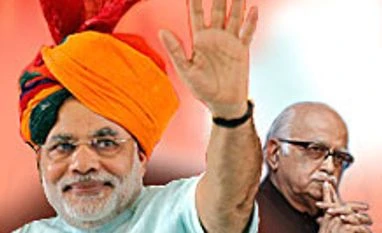Overweening ambition is a person’s worst enemy. Nobody imagined that P V Narasimha Rao would win the berth in 1991. Neither did H D Deve Gowda, I K Gujral or Manmohan Singh dream that they would head the government. In 2004, Atal Bihari Vajpayee was a very strong candidate for the National Democratic Alliance (NDA). But he lost to the United Progressive Alliance (UPA), which fought under the leadership of Congress chief Sonia Gandhi. Vajpayee miserably failed to decode voters’ collective message. And, to a certain extent Bharatiya Janata Party’s (BJP) patriarch LK Advani is following the footmarks of the poet-Prime Minister.
Why is Advani in such a tearing hurry to become prime minister? Will Advani join the yet-to-be-formed Third Front? Will he became a pawn in the hands of Mamata Banerjee, Mulayam Singh Yadav, Nitish Kumar and Chandrababu Naidu, in particular? Will the BJP patriarch dance to the tunes of Congress, in general? Will the Congress give him a special quota (read outside support) to accomplish his dreams? Did he commit political harakiri in guise of illness? Will Advani be able to revisit the party and the parivar even search for a symbol that energised him for over five decades? Is Advani's personal goal coming in the way of the larger interest of the BJP? No one has a clear cut answer at present. In Macbeth, William Shakespeare presented ambition as a fatal quality. Macbeth, the tragic hero, is a person whose weak character causes him to submit to his evil desires and allow him to be easily manipulated by other people. Advani has had his go at the prime ministership and lost.
. BLOG | Modi not a mukhota (mask)
. BJP cadres in NaMo-PM chant, top leaders cautious
. BLOG | Modi not a mukhota (mask)
. BJP cadres in NaMo-PM chant, top leaders cautious
To Advani's credit, it must be recorded that he was successful in getting nominated as the party's prime ministerial candidate despite being forced out of the post of party president. Political pundits say the veteran was expecting a repeat of the 2009 situation in the next Lok Sabha polls. In the saffron party, Advani won his distinctive place for calling a spade a spade. At present, the soft-spoken former journalist has fallen between two stools -- opening up space for ridicule from his own party men and winning some support from his arch rivals. On Monday, Trinamool Congress chief Mamata Banerjee floated a ‘federal front’ balloon for the 2014 election. Probably, Advani may join the so-called third front to curtail Gujarat Chief Minister Narendra Modi’s national ambition.
More From This Section
In these turbulent times, Advani should take a leaf out of Morarji Desai’s book. Desai was the first non-Congress Prime Minister of the country and Advani was part of Desai's cabinet in the Janata government. In March 1977 when the Janata Party won a resounding victory in the elections both Choudhary Charan Singh and Jagjivan Ram had been serious contenders for the office of prime minister, along with Desai. The party decided in favour of Desai because he had already held the post of deputy prime minister earlier. In the late sixties, Indira Gandhi abruptly dropped him as the finance minister and arbitrarily nationalized the banks. Desai resigned from the party. In 1977, when elections were called and the Janata Party coalition, a conglomeration of disparate parties with varying ideologies was voted to power, Desai became the Premier.
. The rise and unwilling fall of the 'Bhishma Pitamah' of Indian politics
. The rise and unwilling fall of the 'Bhishma Pitamah' of Indian politics
Too many things have gone wrong for Advani in the last couple of days but one thing remains intact. To turn his dream into reality, the veteran leader must bow out gracefully. The Congress has lost credibility to rule and the BJP would not get the magic number and even the allies are ready to dump the NDA. The situation today is far more conducive for a third front than it was in 2009. Nitish, Mamata and others would readily accept him as an antidote to Modi. In all probability, the Congress will extend an outside support to a weak minority government like it backed the Chandra Shekhar government in 1990. After all in politics, too, an enemy’s enemy is a friend.
)